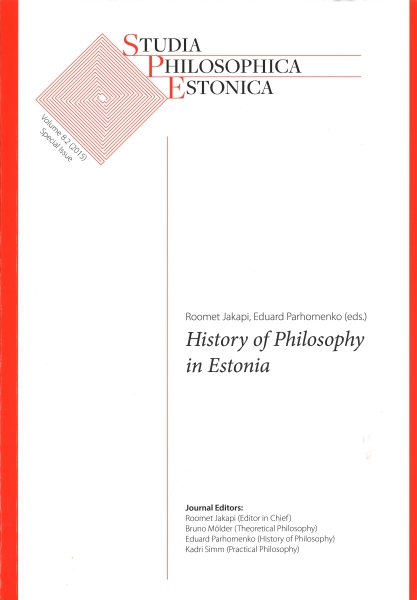Friedrich Nietzsche's Influence on the Estonian Intellectual Landscape
DOI:
https://doi.org/10.12697/spe.2015.8.2.07Keywords:
Nietzsche, will to power, literature, Estonian history of thought, Young Estonia, Zarathustra, overmanAbstract
In my article, I delineate Friedrich Nietzsche’s influence on Estonian intellectual landscape. As it turns out, this influence has been quite remarkable and extends from literature to politics. I start with outlining several orientations of the reception of Nietzsche’s thought in the world and then suggest that with one exception, all those orientations are to some extent also present in Estonian Nietzsche reception. Nietzsche’s reception in Estonia started rather early and one can say that he was somewhat known in Tallinn as well as in Tartu even in his lifetime. The first attempt to translate one of his works (notably Also sprach Zarathustra) into Estonian was made already in 1901. Till the Soviet occupation in 1940, Nietzsche’s thought was rather actively appropriated by Estonian writers, intellectuals and even politicians. In Soviet Union, Nietzsche was prohibited and his works were not freely accessible in public libraries. With the restoration of Estonia’s independence in the beginning of 90s, a new, fresh and active wave of Nietzsche reception also begun. New translations appeared and the reception was generally more faithful and philosophical than in the first period.
References
Anderkopp, Ado [1919?]. „Friedrich Nietzsche ‘Antichrist’”. – F. Nietzsche. Vastkristlane (Antichrist). Tlk U. L. (= Mihkel Juhkam). Tallinn: G. Vildt, pp. 3-5
Annus, Epp 2005. „Noorte püüded ja rõõmus ajalugu: Gustav Suits ja Friedrich Nietzsche”. – Keel ja kirjandus, no. pp. 526-534
Carnap, Rudolf 1959. „The Elimination of Metaphysics through Logical Analysis of Language”. trans. Arthur Pap, in: A.J. Ayer (ed.) Logical Positivim. New York: Free Press, pp. 66-81.
Eestikeelne raamat 1918-1940. 2012. II: Kandle-Raimla, [kirjed] 8661-18683 = Estnisches Buch 1918-1940 = Estonian Book 1918 - 1940 = Зstonska¬ kniga 1918-1940. Ed. by Anne Ainz, Ülvi Kalpus, Külli Kaunissaar, Maie Leppik, Airi Mürk, Merike Ruiso, Aime Veikesaar. Tallinn: Eesti Rahvusraamatukogu
Grenzstein, Ado 1902. „Kostus kodumaa herrale. (Parisi kiri.)” – Olevik, no. 12. II, p. 152
GriÅ¡akova, Marina 2005. „Mõtteid Tammsaarest, Nietzschest ja Dostojevskist”. – Vikerkaar, no. 1- pp. 80-86
Kallas, Aino 1921. Noor-Eesti: Näopildid ja sihtjooned. Trans. by Friedebert Tuglas. Tartu: Noor-Eesti Kirjastus
Kaplinski, Jaan 1995. „Eesti filosoofia”. – Akadeemia, no pp. 1868-1876
Kivimäe, JÜri 2008. „Noor-Eesti tähendust otsides: Vanu ja uusi mõtteid”. – Noor-Eesti kÜmme aastat: Esteetika ja tähendus. (Methis. Studia humaniora Estonica 1/2), pp. 21-43
Kivimäe, Mart 2006a. „’Põhjast tuli valgus’: Nietzscheaana ja regionaalajalooline mälu”. – Sirp, no. 10. II, p. 4
Kivimäe, Mart 2006b. „Brandese-kontekst ja Nietzsche-lege ndid retseptsiooni algperioodil”. – Tuna: Ajalookultuuri ajakiri, no. pp. 39- 49
Kraavi, Janek 2002. „Eestlane Nietzsche”. – Eesti Ekspress: Areen, no. 3 15. VIII, p. B7
Kuks, August 1922. Nietzsche eetika põhjendus. Tallinn: Varrak
Linde, Bernhard 1918 (kaanel 1919). “Noor-Eesti” kÜmme aastat. Tartu
Luiga, Georg Eduard 1902. „Nietzsche eesti kirjanduses”. – Eesti Postimees, no. 21. II, pp. 94-97; no. 28. II, pp. 106-109
Luks, Leo 2003. „Antikristlase kaks ilmumist”. – Vikerkaar, no. 4- pp. 202-207
Nietzsche, Friedrich 1901-1902. „Sarathustra”. Trans. by Ado Grenzstein. – Olevik, no. 2 15. V - no. 12 II
Nietzsche, Friedrich 1977. Briefwechsel: Kritische Gesamtausgabe. Abt. 2. Bd. 2: Briefe an Friedrich Nietzsche April 1869 - Mai 1872. Hrsg. von Giorgio Colli und Mazzino Montinari. Berlin– New-York: Walter de Gruyter, pp. 541-543
Nietzsche, Friedrich 1988. Jenseits von Gut und BÖse. – F. Nietzsche. Sämtliche Werke: Kritische Studienausgabe in 15 Einzelbänden. Bd. 5. Hrsg. von Giorgio Colli und Mazzino Montinari. München: Deutscher Taschenbuch Verlag; Berlin–New York: Walter de Gruyter, pp. 1-243
Richter, Raoul 1922. Friedrich Nietzsche: Sein Leben und sein Werk. FÜnfzehn Vorlesungen gehalten an der Universität zu Leipzig. Leipzig: Felix Meiner Verlag
Russell, Bertrand 1945. The History of Western Philosophy. New York: Simon and Schuster.
Schwenke, Heiner 2006. Zurück zur Wirklichkeit: Bewusstsein und Erkenntnis bei Gustav Teichmüller. (Studien zur Geschichte der Wissenschaften in Basel; N. F. 4.) Basel: Schwabe Verlag
Semper, Johannes 1932. „Järelsõna”. – Friedrich Nietzsche. Nõnda kõneles Zarathustra: Raamat kõigile ja ei kellelegi . Trans. by Johannes Palla, ed. by J. Semper. Tartu: Eesti Kirjanduse Selts, pp. 223-236.
Suits, Gustav 1910-1911. „Lõpusõna”. – Noor-Eesti, no. 5- pp. 637-641
SÜvalep, Ele 1994. „Dionüüsiline Alver”. - Vikerkaar 199 no. 1 pp. 51-57
SÜvalep, Ele 1999. „F. Nietzsche ja F. Tuglas: Dialoog eneseÜletmisest”. – Mis on see ise: Tekst, tagapõhi, isikupära. (Collegium litterarum 11.) Tallinn: Eesti Teaduste Akadeemia Underi ja Tuglase Kirjanduskeskus, pp. 195-202
Tallmeister, Theodor 1921. Friedrich Nietzsche ja ristiusk. Tallinn: Kristliku Kultuuri ja Ilmavaate Edendamise Selts
Tammsaare, A. H. 1986. „Friedrich Nietzsche: Linnulennult”. – A. H.
Tammsaare. Publitsistika. 1.: (1902-1914). (Kogutud teosed; 15. kd.) Ed. and „Afterword” by Eerik Teder. Tallinn: Eesti Raamat, pp. 226-234
Toomus, Friido 1936. Friedrich Nietzsche: Üliinimese kuulutaja. (Suurmeeste elulood 30. Eesti Kirjanduse Seltsi biograafiline seeria; 193 no. 1.) Tartu: Eesti Kirjanduse Selts
Tuglas, Friedebert 1936. Kriitika V. Tartu: Noor Eesti
Undusk, Jaan 1986. „Sisu ja vormi dialektikat Friedebert Tuglase käsitluses”. – Keel ja Kirjandus, no. pp. 133-146
Ungern - Sternberg, Isabella Olga von 1902. Nietzsche im Spiegelbilde seiner Schrift. Von Isabelle, Freifrau v. Ungern-Sternberg, geb. Freiin von der Pahlen. Leipzig: C. G. Naumann
Vaher, Vaapo 1998. „Nietzsche tÜtreke”. - Kultuur ja elu, no. pp. 42-44.





